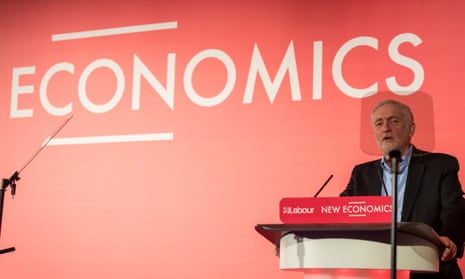Jeremy Corbyn is to attack the Conservatives’ “lack of clarity” on the future economic relationship with Europe in a speech a day after the Labour leader is said to have faced down lobbying from his own party to take a softer line on Brexit.
Corbyn will tell the conference of manufacturers’ organisation EEF on Tuesday that Labour is “insisting the economy must come first” in the Brexit negotiations, a strong hint that the party would accept close regulatory alignment.
Senior shadow cabinet members gathered for an “away day” several party sources said would see Corbyn challenged to be more forthright over whether Labour would push for the UK to be a new customs union after Brexit.
It is understood that his advisers believe he has been sufficiently clear on the matter already, that Labour is open to a newarrangement with the EU which would in practice function very similarly to the current customs union.
Quick GuideWhat are Brexit options now? Four scenarios
Show
Staying in the single market and customs union
The UK could sign up to all the EU’s rules and regulations, staying in the single market – which provides free movement of goods, services and people – and the customs union, in which EU members agree tariffs on external states. Freedom of movement would continue and the UK would keep paying into the Brussels pot. We would continue to have unfettered access to EU trade, but the pledge to “take back control” of laws, borders and money would not have been fulfilled. This is an unlikely outcome and one that may be possible only by reversing the Brexit decision, after a second referendum or election.
The Norway model
Britain could follow Norway, which is in the single market, is subject to freedom of movement rules and pays a fee to Brussels – but is outside the customs union. That combination would tie Britain to EU regulations but allow it to sign trade deals of its own. A “Norway-minus” deal is more likely. That would see the UK leave the single market and customs union and end free movement of people. But Britain would align its rules and regulations with Brussels, hoping this would allow a greater degree of market access. The UK would still be subject to EU rules.
The Canada deal
A comprehensive trade deal like the one handed to Canada would help British traders, as it would lower or eliminate tariffs. But there would be little on offer for the UK services industry. It is a bad outcome for financial services. Such a deal would leave Britain free to diverge from EU rules and regulations but that in turn would lead to border checks and the rise of other “non-tariff barriers” to trade. It would leave Britain free to forge new trade deals with other nations. Many in Brussels see this as a likely outcome, based on Theresa May’s direction so far.
No deal
Britain leaves with no trade deal, meaning that all trade is governed by World Trade Organization rules. Tariffs would be high, queues at the border long and the Irish border issue severe. In the short term, British aircraft might be unable to fly to some European destinations. The UK would quickly need to establish bilateral agreements to deal with the consequences, but the country would be free to take whatever future direction it wishes. It may need to deregulate to attract international business – a very different future and a lot of disruption.
Corbyn is reported to have told Michel Barnier, the EU’s chief negotiator, that a customs union was “a viable end point”, a phrase that sources close to the Labour leader have repeated in recent weeks.
Emily Thornberry, the shadow foreign secretary, said on Sunday: “We’ve looked at it and we cannot see a way forward when it comes to Northern Ireland or to tariff-free trade across Europe without us being in some form of customs union that probably looks very much like the customs union that there is at the moment.”
As well as Corbyn and Thornberry, others attending Monday’s “away day” was Tom Watson, the deputy leader, and Keir Starmer, the shadow Brexit secretary. Senior Labour sources said the significance of the meeting had been overblown and claimed it was a regular gathering of the shadow cabinet subcommittee on Brexit.
The “away day” was not away, but in a room in Westminster, and it did not last an entire day, but about three hours.
“It is not a decision-making body,” a senior source said. “This whole ‘get-off-the-fence’ thing is generally by people who don’t like the position that we’ve got and would like it to change. We have a position, which is consistent.”
In his speech on Tuesday, Corbyn will say: “Business needs clarity and with two out of six of the government’s ‘road to Brexit’ speeches already delivered, the Tories’ approach to Brexit is, if anything, less clear.
“To make decisions about where, when, perhaps even whether to invest, you need to know what markets you will have access to, what regulations and product standards you will be subject to, who you will be able to recruit, what will happen to our supply chains, which we all know are currently integrated across borders.
“That’s why Labour has from the start taken the practical position of accepting the result of the referendum and insisting the economy must come first.”
The party has been lobbied by backbench MPs, members and other activists who support a soft Brexit in recent weeks. More than 20,000 people have emailed the party over the past week, urging it to set up a special forum to consult members on Brexit, coordinated by the Labour for the Single Market group and Open Britain.
Theresa May is to host her own cabinet away-day at the prime minister’s country residence of Chequers on Thursday, but Downing Street said it did not expect any solid agreement to be the result of the meeting.
